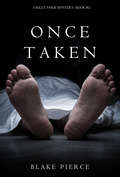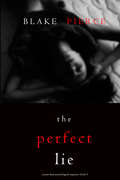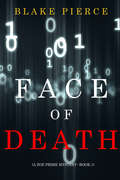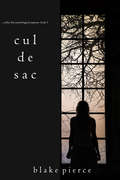
Блейк Пирс
Once Craved
Chapter Three
The man sat in his car in the parking lot, watching the whore as she approached along the street. “Chiffon,” she called herself. Obviously not her real name. And he was sure there was a lot more about her that he didn’t know.
I could make her tell me, he thought. But not here. Not today.
He wouldn’t kill her here today either. No, not right here so near her regular workplace – the so-called “Kinetic Custom Gym.” From where he sat, he could see the decrepit exercise machinery through the storefront windows – three treadmills, a rowing machine, and a couple of weight machines, none of them working. As far as he knew, nobody ever came here to actually exercise.
Not in a socially acceptable manner anyway, he thought with a smirk.
He didn’t come around to this place much – not since he’d taken that brunette who had worked here years ago. Of course, he hadn’t killed her here. He’d lured her off to a motel room for “extra services” and with the promise of a lot more money.
It hadn’t been premeditated murder even then. The plastic bag over her head was only meant to add a fantasy element of danger. But once it was done, he’d been surprised at how deeply satisfied he’d felt. It had been an epicurean pleasure, distinctive even in his lifetime of pleasures.
Still, in his trysts since then, he’d exercised more care and restraint. Or at least he had until last week, when the same game went deadly again with that escort – what was her name?
Oh, yes, he remembered. Nanette.
He’d suspected at the time that Nanette might not be her real name. Now he’d never find out. In his heart, he knew that her death was not an accident. Not really. He’d meant to do it. And his conscience was unsullied. He was ready to do it again.
The one who called herself Chiffon was approaching about a half a block away, clad in a yellow tube top and a barely existent skirt, tottering toward the gym on impossibly high heels while talking on her cell phone.
He really wanted to know if Chiffon was her real name. Their one previous professional encounter had been a failure – her fault, he was sure, not his. Something about her had put him off.
He’d known perfectly well that she was older than she claimed to be. It was more than just her body – even teenage whores had stretch marks from childbirth. And it wasn’t the lines in her face. Whores aged faster than any kind of women he knew.
He couldn’t put his finger on it. But there was plenty about her that perplexed him. She displayed a certain kind of faux-girlish enthusiasm that wasn’t the mark of a true professional – not even a novice.
She giggled too much, like a child playing a game. She was too eager. And most oddly, he suspected that she actually liked her job.
A whore who really enjoys sex, he thought, watching her come nearer. Who ever heard of such a thing?
Frankly, it turned him off.
Well, at least he was sure that she wasn’t an undercover cop. He would have picked up on that in a split second.
When she got close enough to see him, he honked his car horn. She stopped talking on the phone for a moment and looked his way, shielding her eyes from the morning sunlight. When she saw who it was she waved and smiled – a smile that looked, for all the world, completely sincere.
Then she walked around back of the gym toward the “service” entrance. He realized that she probably had an appointment to keep inside the brothel. No matter, he would hire her some other day when he was in the mood for a specific kind of pleasure. Meanwhile, there were plenty of other hookers around.
He remembered how they’d left things last time. She’d been cheerful and good-natured and apologetic.
“Come back anytime,” she’d told him. “It will go better next time. We’ll hit it off together. Things will get really exciting.”
“Oh, Chiffon,” he murmured aloud to himself. “You’ve got no idea.”
Chapter Four
Gunfire rang out around Riley. To her left, she heard the noisy cracks of pistols. To her right, she heard heavier weaponry – blasts from assault rifles and staccato sprays from submachine guns.
In the midst of the clamor, she drew her Glock handgun from her hip holster, dropped to a prone position, and fired off six rounds. She rose into a kneeling position and fired three rounds. She deftly and quickly reloaded, then stood and fired six rounds, and finally knelt and fired three more rounds with her left hand.
She stood up and holstered her weapon, then stepped back from the firing line and pulled off her earmuffs and eye protectors. The target with the bottle-shaped outline was twenty-five yards away. Even from this distance, she could see that she had clustered all her shots nicely together. In neighboring lanes, the FBI Academy trainees kept up their practice under the guidance of their instructor.
It had been a while since Riley had fired a weapon, even though she was always armed on the job. She’d reserved this lane at the FBI Academy firing range for a little target practice and, as always, there was something satisfying about the gun’s powerful recoil, the raw force of it.
She heard a voice behind her.
“Kind of old-school, aren’t you?”
She turned and saw Special Agent Bill Jeffreys standing nearby, grinning. She smiled back. Riley knew exactly what he meant by “old-school.” A few years ago, the FBI had changed the live-fire rules for pistol qualification. Firing from a prone position had been part of the old drill, but it was no longer required. Now more emphasis was put on firing at targets from up close, between three and seven yards. That was supplemented by the virtual reality installation where agents were immersed in scenarios involving armed confrontations in close quarters. And trainees also went through the notorious Hogan’s Alley, a ten-acre mocked-up town where they fought off imitation terrorists with paintball guns.
“Sometimes I like to go old-school,” she said. “I figure that someday I might actually have to use deadly force at a distance.”
From her own experience, Riley knew that the real thing was almost always up close and personal, and often unexpected. In fact, she’d actually had to fight hand to hand in two recent cases. She’d killed one attacker with his own knife and another with a random rock.
“Do you think anything prepares these kids for the real thing?” Bill asked, nodding toward the trainees who were now finished and leaving the firing range.
“Not really,” Riley said. “In VR your brain does accept the scenario as real, but there’s no imminent danger, no pain, no rage to control. Something inside always knows there’s no chance of being killed.”
“Right,” Bill said. “They’ll have to find out what it’s really like just like we did a lot of years ago.”
Riley glanced sideways at him as they moved farther away from the firing line.
Like her, he was forty years old with touches of gray in his dark hair. She wondered what it meant that she found herself mentally comparing him to her leaner, slighter male neighbor.
What was his name? she asked herself. Oh, yeah – Blaine.
Blaine was good-looking, but she wasn’t sure whether he gave Bill a run for his money. Bill was big, solid, and quite attractive.
“What brings you here?” she asked.
“I heard you’d be here,” he said.
Riley squinted at him uneasily. This probably wasn’t just a friendly visit. From his expression, she detected that he wasn’t ready to tell her what he wanted just yet.
Bill said, “If you want to do the whole drill, I’ll keep time for you.”
“I’d appreciate that,” Riley said.
They moved off to a separate section of the shooting range, where she wouldn’t be at risk of being hit by stray bullets from the trainees.
While Bill operated a timer, Riley breezed through all the stages of the FBI pistol qualification course, firing at the target from three yards, then five, then seven, then fifteen. The fifth and last stage was the only part that she found the least bit challenging – firing from behind a barricade at twenty-five yards.
When she was through, Riley took off her headgear. She and Bill walked up to the target and checked her work. All the impact marks were clustered nicely together.
“A hundred percent – a perfect score,” Bill said.
“It had better be,” Riley said. She’d hate it if she were getting rusty.
Bill pointed toward the earthen backstop beyond the target.
“Kind of surreal, huh?” he said.
Several white-tailed deer were contentedly grazing on top of the hill. They’d actually gathered there while she’d been shooting. They were within easy range, even with her pistol. But they weren’t the least bit bothered by all the thousands of bullets slamming into targets just below the high ridge they walked on.
“Yes,” she said, “and beautiful.”
Around this time of year, the deer were a common sight here at the range. It was hunting season, and somehow they knew that they would be safe here. In fact, the grounds of the FBI Academy had become a sort of wildlife haven for lots of animals, including foxes, wild turkeys, and groundhogs.
“A couple of days ago, one of my students saw a bear in the parking lot,” Riley said.
Riley took a few steps toward the backstop. The deer raised their heads, stared at her, and trotted away. They weren’t afraid of gunfire, but they didn’t want people getting too close.
“How do you suppose they know?” Bill asked. “That it’s safe here, I mean. Don’t all gunshots sound alike?”
Riley simply shook her head. It was a mystery to her. Her father had taken her hunting when she was little. To him, deer were simply resources – food and hide. It hadn’t bothered her to kill them all those years ago. But that had changed.
It seemed odd, now that she thought about it. She had no trouble using deadly force against a human being when it was necessary. She could kill a man in a heartbeat. But to kill one of these trusting creatures now seemed unthinkable.
Riley and Bill walked off to a nearby rest area and sat down together on a bench. Whatever it was he came to talk about here, he still seemed reticent.
“How are you doing on your own?” she asked in a gentle voice.
She knew it was a delicate question and she saw him wince. His wife had recently left him after years of tension between his job and home life. Bill had been worried about the prospect of losing touch with his young sons. Now he was living in an apartment in the town of Quantico and spending time with his boys on weekends.
“I don’t know, Riley,” he said. “I don’t know if I’ll ever get used to it.”
He was clearly lonely and depressed. She had been through enough of that herself during her own recent separation and then divorce. She also knew that the time after a separation was particularly fragile. Even if the relationship hadn’t been very good, you found yourself out in a world of strangers, missing years of familiarity, never knowing quite what to do with yourself.
Bill touched her arm. His voice a bit thick with emotion, he said, “Sometimes I think that all I’ve got left to depend on in life is … you.”
For a moment Riley felt like hugging him. When they had worked as partners, Bill had come to her rescue plenty of times, both physically and emotionally. But she knew she had to be careful. And she knew that people could be pretty crazy at times like this. She had actually phoned Bill one drunken night and proposed that they begin an affair. Now the situations were reversed. She could sense his impending dependence on her, now that she was just beginning to feel free and strong enough to be on her own.
“We were good partners,” she said. It was lame, but she couldn’t think of anything else to say.
Bill took a long, deep breath.
“That’s what I came out here to talk to you about,” he said. “Meredith told me he’d called you about the Phoenix case. I’m working on it. I need a partner.”
Riley felt just a trace of irritation. Bill’s visit was starting to seem like a bit of an ambush.
“I told Meredith I’d think about it,” she said.
“And now I’m asking you,” Bill said.
A silence fell between them.
“What about Lucy Vargas?” Riley asked.
Agent Vargas was a rookie who had worked closely with Bill and Riley on their most recent case. They both were impressed with her work.
“Her ankle hasn’t healed,” Bill said. “She won’t be back in the field for another month at least.”
Riley felt foolish for asking. When she, Bill, and Lucy had closed in on Eugene Fisk, the so-called “chain killer,” Lucy had taken a fall and broken her ankle and almost gotten killed. Of course she couldn’t go back to work so soon.
“I don’t know, Bill,” Riley said. “This break away from work is doing me a lot of good. I’ve been thinking about just teaching from now on. All I can tell you is what I told Meredith.”
“That you’ll think about it.”
“Right.”
Bill let out a grunt of discontentment.
“Could we at least get together and talk it over?” he asked. “Maybe tomorrow?”
Riley fell silent again for a moment.
“Not tomorrow,” she said. “Tomorrow I have to watch a man die.”
Chapter Five
Riley looked through the window into the room where Derrick Caldwell would soon die. She was sitting beside Gail Bassett, the mother of Kelly Sue Bassett, Caldwell’s final victim. The man had killed five women before Riley had stopped him.
Riley had wavered about accepting Gail’s invitation to the execution. She’d only seen one other, that time as a volunteer witness sitting among reporters, lawyers, law enforcement officers, spiritual advisors, and the jury foreman. Now she and Gail were among nine relatives of women that Caldwell had murdered, all of them crowded together in a tight space, sitting on plastic chairs.
Gail, a small sixty-year-old woman with a delicate, birdlike face, had kept up contact with Riley over the years. By the time of the execution her husband had died, and she had written Riley that she had no one to see her through the momentous event. So Riley had agreed to join her.
The death chamber was right there on the other side of the window. The only furniture in the room was the execution gurney, a cross-shaped table. A blue plastic curtain hung at the head of the gurney. Riley knew that the IV lines and lethal chemicals were behind that curtain.
A red telephone on the wall connected with the governor’s office. It would only ring in case of a last-minute decision for clemency. No one expected that to happen this time. A clock over the door to the room was the only other visible decor.
In Virginia, convicted offenders could choose between the electric chair and lethal injection, but the chemicals were far more often chosen. If the prisoner made no choice, injection was assigned.
Riley was almost surprised that Caldwell hadn’t opted for the electric chair. He was an unrepentant monster who seemed to welcome his own death.
The clock read 8:55 when the door opened. Riley heard a wordless murmur in the room as several members of the execution team ushered Caldwell into the chamber. Two guards flanked him, gripping each arm, and another followed right behind him. A well-dressed man came in after all the rest – the prison warden.
Caldwell was wearing blue pants, a blue work shirt, and sandals with no socks. He was handcuffed and shackled. Riley hadn’t seen him for years. During his brief stint as a serial killer he’d had unruly long hair and a shaggy beard, a bohemian look befitting a sidewalk artist. Now he was clean-shaven and ordinary looking.
Although he didn’t put up a struggle, he looked frightened.
Good, Riley thought.
He looked at the gurney, then glanced quickly away. He seemed to be trying not to look at the blue plastic curtain at the head of the gurney. For a moment, he stared into the viewing room window. He suddenly seemed calmer and more collected.
“I wish he could see us,” Gail murmured.
They were shielded from his view behind one-way glass and Riley didn’t share Gail’s wish. Caldwell had already looked at her much too closely for her liking. To capture him, she’d gone undercover. She’d pretended to be a tourist on the Dunes Beach Boardwalk and hired him to draw her portrait. As he worked, he’d showered her with flowery flattery, telling her that she was the most beautiful woman he’d drawn in a long time.
She knew right then that she was his next intended victim. That night she’d served as bait to draw him out, letting him stalk her along the beach. When he had tried to attack her, backup agents had no trouble catching him.
His capture had been pretty nondescript. The discovery of how he had carved up his victims and kept them in his freezer had been another matter. Standing there when the freezer was opened was one of the most harrowing moments of Riley’s career. She still felt pity for the victims’ families – Gail among them – for having to identify their dismembered wives, daughters, sisters …
“Too beautiful to live,” he had called them.
It chilled Riley deeply that she had been one of the women he had seen that way. She’d never thought of herself as beautiful, and men – even her ex-husband, Ryan – seldom told her that she was. Caldwell was a stark and horrible exception.
What did it mean, she wondered, that a pathological monster had found her so perfectly lovely? Had he recognized something inside her that was as monstrous as he? For a couple of years after his trial and conviction, she’d had nightmares about his admiring eyes, his honeyed words, and his freezer full of body parts.
The execution team got Caldwell up onto the execution gurney, removed the cuffs and shackles, took off his sandals, and strapped him into place. They fastened him down with leather bands – two across his chest, two to hold his legs, two around his ankles, and two around his wrists. His bare feet were turned toward the window. It was hard to see his face.
Suddenly, the curtains closed over the viewing room windows. Riley understood that this was to conceal the phase of the execution where something was most likely to go wrong – say, the team might have trouble finding a suitable vein. Still, she found it peculiar. The people in both viewing rooms were about to watch Caldwell die, but they were not allowed to witness the mundane insertion of the needles. The curtains swayed a little, apparently brushed by one of the team members moving around on the other side.
When the curtains opened again, the IV lines were in place, running from the prisoner’s arms through holes in the blue plastic curtains. Some members of the execution team had retreated behind those curtains, where they would administer the lethal drugs.
One man held the red telephone receiver, ready to receive a call that would surely never come. Another spoke to Caldwell, his words a barely audible crackle over the poor sound system. He was asking Caldwell whether he had any last words.
By contrast, Caldwell’s response came through with startling clarity.
“Is Agent Paige here?” he asked.
His words gave Riley a jolt.
The official didn’t reply. It wasn’t a question that Caldwell had any right to have answered.
After a tense silence, Caldwell spoke again.
“Tell Agent Paige that I wish my art could have done justice to her.”
Although Riley couldn’t see his face clearly, she thought she heard him chuckle.
“That’s all,” he said. “I’m ready.”
Riley was flooded by rage, horror, and confusion. This was the last thing she had expected. Derrick Caldwell had chosen to make his last living moments all about her. And sitting here behind this unbreakable shield of glass, she was helpless to do anything about it.
She had brought him to justice, but in the end, he had achieved a weird, sick kind of revenge.
She felt Gail’s small hand gripping her own.
Good God, Riley thought. She’s comforting me.
Riley fought down a wave of nausea.
Caldwell said one more thing.
“Will I feel it when it begins?”
Again, he received no reply. Riley could see fluid moving through the transparent IV tubes. Caldwell took several deep breaths and appeared to fall asleep. His left foot twitched a couple of times, then fell still.
After a moment, one of the guards pinched both feet and got no reaction. It seemed a peculiar sort of gesture. But Riley realized that the guard was checking to make sure the sedative was working and that Caldwell was fully unconscious.
The guard called out something inaudible to the people behind the curtain. Riley saw a renewed flow of fluid through the IV tubes. She knew that a second drug was in the process of stopping his lungs. In a little while, a third drug would stop his heart.
As Caldwell’s breathing slowed, Riley found herself thinking about what she was watching. How was this different from the times she had used lethal force herself? In the line of duty, she had killed several killers.
But this was not like any of those other deaths. By comparison, it was bizarrely controlled, clean, clinical, immaculate. It seemed inexplicably wrong. Irrationally, Riley found herself thinking …
I shouldn’t have let it come to this.
She knew she was wrong, that she had carried out Caldwell’s apprehension professionally and by the book. But even so she thought …
I should have killed him myself.
Gail held Riley’s hand steadily for ten long minutes. Finally, the official beside Caldwell said something that Riley couldn’t hear.
The warden stepped out from behind the curtain and spoke in a clear enough voice to be understood by all the witnesses.
“The sentence was successfully carried out at 9:07 a.m.”
Then the curtains closed across the window again. The witnesses had seen all that they were meant to see. Guards came into the room and urged everybody to leave as quickly as possible.
As the group spilled out into the hallway, Gail took hold of Riley’s hand again.
“I’m sorry he said what he said,” Gail told her.
Riley was startled. How could Gail be worried about Riley’s feelings at a time like this, when justice had finally been done to her own daughter’s killer?
“How are you, Gail?” she asked as they walked briskly toward the exit.
Gail walked along in silence for a moment. Her expression seemed completely blank.
“It’s done,” she finally said, her voice numb and cold. “It’s done.”
In an instant they stepped out into the morning daylight. Riley could see two crowds of people across the street, each roped away from the other and tightly controlled by police. On one side were people who had gathered to cheer on the execution, wielding hateful signs, some of them profane and obscene. They were understandably jubilant. On the other side were anti–death penalty protesters with their own signs. They’d been out here all night holding a candlelight vigil. They were much more subdued.
Riley found that she couldn’t muster sympathy for either group. These people were here for themselves, to make a public show of their outrage and righteousness, acting out of sheer self-indulgence. As far as she was concerned, they had no business being here – not among people whose pain and grief were all too real.
Between the entrance and the crowds was a swarm of reporters, with media trucks nearby. As Riley waded among them, one woman rushed up to her with a microphone and a cameraman behind her.
“Agent Paige? Are you Agent Paige?” she said.
Riley didn’t reply. She tried to go past the reporter.
The reporter stayed with her doggedly. “We’ve heard that Caldwell mentioned you in his last words. Do you care to comment?”
Other reporters closed in on her, asking the same question. Riley gritted her teeth and pushed on through the throng. At last she broke free from them.
As she hurried toward her car, she found herself thinking about Meredith and Bill. Both of them had implored her to take on a new case. And she was avoiding giving either of them any kind of an answer.
Why? she wondered.
She had just run away from reporters. Was she running away from Bill and Meredith as well? Was she running away from who she really was? From all that she had to do?
*
Riley was grateful to be home. The death she had witnessed that morning still left her with an empty feeling, and the drive back to Fredericksburg had been tiring. But when she opened the door of her townhouse, something didn’t seem right.
It was unnaturally silent. April should be home from school by now. Where was Gabriela? Riley went into the kitchen and found it empty. A note was on the kitchen table.
Me voy a la tienda, it read. Gabriela had gone to the store.
Riley gripped the back of a chair as a wave of panic swept over her. Another time that Gabriela had gone to the store, April had been kidnapped from her father’s house.
Darkness, a glimpse of flame.
Riley turned and ran to the foot of the stairs.
“April,” she screamed.
There was no answer.
Riley raced up the staircase. Nobody was in either of the bedrooms. Nobody was in her small office.
Riley’s heart was pounding, even though her mind was telling her that she was being foolish. Her body wasn’t listening to her mind.
She raced back downstairs and out onto the back deck.
“April,” she screamed.
But no one was playing in the yard next door and no kids were in sight.
She stopped herself from letting out another scream. She didn’t want these neighbors convinced that she was truly crazy. Not so soon.
She fumbled at her pocket and pulled out her cell phone. She texted a message to April.
She received no reply.
Riley went back inside and sat down on the couch. She held her head in her hands.
She was back in the crawlspace, lying on the dirt in the darkness.
But the small light was moving toward her. She could see his cruel face in the glow of the flames. But she didn’t know whether the killer was coming for her or for April.
Riley forced herself to separate the vision from her present reality.
Peterson is dead, she told herself emphatically. He will never torture either of us again.
She sat up on the sofa and tried to focus on here and now. Today she was here in her new home, in her new life. Gabriela had gone to the store. April was surely somewhere nearby.
Her breathing slowed, but she couldn’t make herself get up. She was afraid she’d go outside and yell again.
After what seemed like a long time, Riley heard the front door opening.
April walked through the door, singing.
Now Riley could get to her feet. “Where the hell have you been?”
April looked shocked.
“What’s your problem, Mom?”
“Where were you? Why didn’t you answer my text?”
“Sorry, I had my phone on mute. Mom, I was just over at Cece’s house. Just across the street. When we got off the school bus, her mom offered us ice cream.”
“How was I supposed to know where you were?”
“I didn’t think you’d be home yet.”
Riley heard herself yelling, but couldn’t make herself stop. “I don’t care what you thought. You weren’t thinking. You have to always let me know …”
The tears running down April’s face finally stopped her.
Riley caught her breath, rushed forward, and hugged her daughter. At first April’s body was stiff with anger, but Riley could feel her relax slowly. She realized that tears were running down her own face too.
“I’m sorry,” Riley said. “I’m sorry. It’s just that we went through so much … so much awfulness.”
“But it’s all over now,” April said. “Mom, it’s all over.”
They both sat down on the couch. It was a new couch, bought when they had moved here. She had bought it for her new life.
“I know that it’s all over,” Riley said. “I know that Peterson is dead. I’m trying to get used to that.”
“Mom, everything is so much better now. You don’t have to worry about me every minute. And I’m not some stupid little kid. I’m fifteen.”
“And you’re very smart,” Riley said. “I know. I’ll just have to keep reminding myself. I love you, April,” she said. “That’s why I get so crazy sometimes.”
“I love you too, Mom,” April said. “Just don’t worry so much.”
Riley was delighted to see her daughter smile again. April had been kidnapped, held captive, and threatened with that flame. She seemed to be back to being a perfectly normal teenager even if her mother hadn’t yet regained her stability.
Still, Riley couldn’t help but wonder whether dark memories still lurked somewhere in her daughter’s mind, waiting to erupt.
As for herself, she knew that she needed to talk to somebody about her own fears and recurring nightmares. It would have to be soon.







